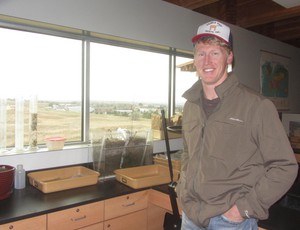Rangeland Complex earns students' praise

CHADRON – “The new Rangeland Complex provides a singular space for range students to call their own. It’s a space for studying, completing projects and labs.”
That’s how Chadron State College rangeland management student Joel Milos describes the educational impact of the new Rangeland Complex located on the southeastern edge of campus.
The complex, situated on a bluff overlooking the scenic 281-acre campus, was formally dedicated in Sept. 2015. It includes a two-story classroom/lab building with dedicated spaces for animal dissection and soil analysis and the adjacent Coffee Agricultural Pavilion where students take livestock classes and practice rodeo skills.
Milos, a junior from Bellevue who is working on a rangeland degree with a wildlife management option and biology minor, said a primary benefit of the new complex is the access it provides.
“The adjacent pastures and grassland provides the space to practice using the skills and tools that we learn in the classroom,” Milos said.
Jenna Lincoln, a rangeland student from Bartlett who is taking degree options in livestock and water resources management, agreed.
“I like the convenience of having discussions and lectures in the classroom and then going outside for the hands-on experience, all in the same class time,” Lincoln said. “I think it helps students better understand what they are learning in lectures.”
Classes in soil science and hydrology make the advantages of the location clear for Micah Scherbarth, a junior from Gordon.
“The range center is close to where many of our holes for studying soil profiles were dug,” said Scherbarth, whose focus is livestock management and agribusiness. “There is room to work outside to get a little dirty and measure infiltration rates into the soil. With the new range center, I believe the professors are better able to instruct students in a more hands-on way.”
The new building has also been outfitted with specialized equipment that has been valuable for studies, according to Jason Scholz, a senior from Grand Island, who will graduate in December with a wildlife option on his rangeland degree. Scholz said a refrigerator for storing animal specimens for dissection and a sifter used in analyzing soil types are among several unique items. A drying machine used in determining the quantity of organic matter in soil samples has been a useful tool, said William Krause, a senior in the rangeland management program from Spring Branch, Texas.
From the expansive windows of the lab classroom, Krause pointed out the location of an experiment that students have been conducting to explore the best way of controlling smooth brome, an invasive grass species. The tests included chemical controls, heavy and moderate grazing and fire.
“We’ll go back in spring and see what the difference is,” he said.
Scherbarth also praised the lab facilities in the new building.
“The updated classroom laboratories at the Rangeland Complex are valuable assets to the ag department,” he said.
The new facilities and equipment have been good for morale, and should help attract more students to CSC’s rangeland program, which is one of the largest in the country, said Krause.
“I think the range center will help to attract new students to the program and ensure its continued growth,” agreed Scherbarth.
Academic studies in the rangeland department have already expanded the horizons of some of the CSC students.
“I knew I wanted to be involved in agriculture, but it wasn’t until I added a water resources management minor that I knew I wanted to become part of conserving the earth’s natural resources,” Lincoln said.
Scherbarth said there’s more to the program than just agriculture.
“I soon discovered there was a lot more to know and there are many different approaches on rangeland management. As a result, I have grown to really enjoy my area of study,” he said.
The rangeland program also offers a broad choice of internship opportunities that give students an opportunity to explore a variety of potential career choices, said Krause.
And Krause said one of the main things he will take away from his college career is the need to continue learning even after graduation.
“The professors have really taught us that when you get that job and have a career, you will still have a lot to learn,” he said. “They set you up to learn when you get out into the real world.”
Category: Campus News, Range Management

